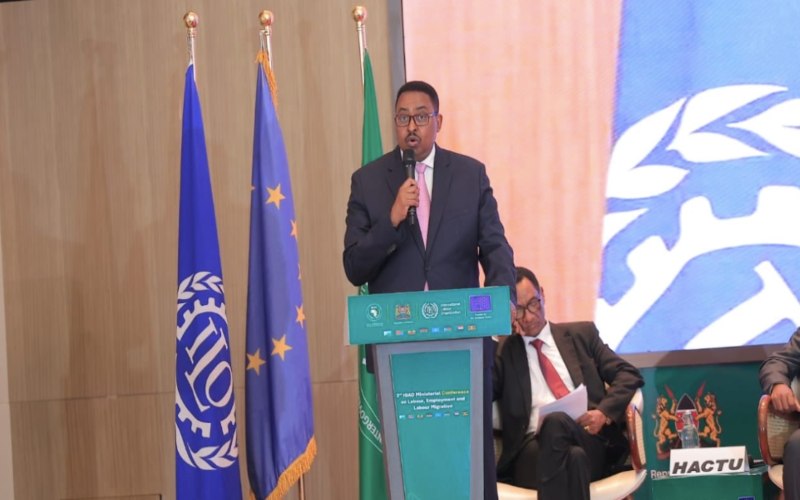IGAD Chief urges action over irregular migration, joblessness in Horn of Africa

Gebeyehu revealed that more than 1.5 million citizens from IGAD countries migrate to the Middle East and Gulf states annually, through the dangerous Red Sea route, with 60,000 irregular arrivals recorded in Yemen in 2024 alone.
The Intergovernmental Authority on Development (IGAD) Executive Secretary Workneh Gebeyehu has urged member states to move from declarations and take concrete action to address irregular migration and youth unemployment across the Horn of Africa region.
Speaking at the 3rd IGAD Ministerial Conference on Labour, Employment and Labour Migration in Nairobi, Workneh noted that the region faces a demographic risk as unemployment and unsafe migration continue to rise across the region.
More To Read
- Kenyan journalists celebrate climate reporting wins at IGAD Media Awards 2025
- IGAD ministers renew regional pact on refugees as Kenya demands fair burden‑sharing
- Kenya’s refugee population hits 860,000 as State pushes integration plan
- High-rise living in Nairobi’s Pipeline estate is stressful: How men and women cope
- IGAD rallies region to tackle deepening displacement crisis amid funding cuts, conflict
- Daua Dam, irrigation masterplan gain momentum after high-level talks in Nairobi
"With unemployment at 16 per cent and youth joblessness reaching 28 per cent, we are witnessing a demographic dividend turn into demographic risk," he said.
Further, Workneh revealed that more than 1.5 million citizens from IGAD countries migrate to the Middle East and Gulf states annually, through the dangerous Red Sea route, with 60,000 irregular arrivals recorded in Yemen in 2024 alone.
"Over the past decade, this route has claimed 3,400 lives. Behind each number is a family waiting, a future extinguished," he said.
For those who reach their destinations, Workneh noted that the situation is often far from ideal, with many migrant workers facing contract substitution, wage theft and unsafe working conditions, particularly in the domestic and construction sectors.
While commending Kenya for hosting the conference, Workneh called for stronger labour agreements with Gulf countries, better regional data-sharing and the inclusion of migrant workers in portable social protection schemes.
"This conference must be different. The lives being lost in the Red Sea, the abuse faced by workers abroad, and youth unemployment pushing people toward irregular migration demand urgent, coordinated action," he said.
On his part, Labour Cabinet Secretary Dr Alfred Mutua echoed Workneh's remarks, stressing that stronger labour governance must remain at the centre of regional cooperation.
He added that the region's rising unemployment, driven by rapid population growth, conflict, weak job creation and skills mismatch, continues to push many young people toward irregular migration.
"We must address unemployment, improve social protection and ensure the fundamental rights of migrant workers are upheld at every stage of the migration process," he said.
Ethiopia's representative also backed the IGAD Executive Secretary's call for urgent, coordinated action, saying that the region must translate existing frameworks into tangible outcomes.
He likewise urged member states to ratify key International Labour Organisation (ILO) conventions and strengthen social protection systems, particularly for vulnerable migrant and informal workers.
"This is both a moral and an economic imperative," he said, adding that Ethiopia supports the creation of a dedicated technical team to advance IGAD's engagement with Gulf Cooperation Council states on migrant worker welfare.
Building on the discussion, South Sudan's Labour Minister James Hoth Mai highlighted new national reforms supporting IGAD's 2021 Djibouti Declaration, from labour policy drafts to the creation of a migrant resource centre in Juba.
He also reaffirmed South Sudan's commitment to aligning its frameworks with regional standards to protect migrant workers and expand job opportunities.
Additionally, a representative from the International Organisation of Migration (IOM) lauded IGAD for advancing transformative initiatives such as the Free Movement Protocol, the Djibouti Declaration, and the IGAD Single Visa Initiative, noting that all are critical steps toward a region where mobility is safe, regular and beneficial to all.
"IOM stands ready to support Member States in turning these policy commitments into measurable results - for workers seeking dignity, for communities building resilience, and for a region investing in shared prosperity through mobility," he said.
Top Stories Today











































